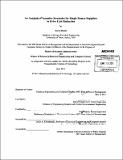| dc.contributor.advisor | David Simchi-Levi and Roy Welsch. | en_US |
| dc.contributor.author | Resch, Kevin (Kevin Scott) | en_US |
| dc.contributor.other | Leaders for Global Operations Program. | en_US |
| dc.date.accessioned | 2011-09-27T18:37:17Z | |
| dc.date.available | 2011-09-27T18:37:17Z | |
| dc.date.copyright | 2011 | en_US |
| dc.date.issued | 2011 | en_US |
| dc.identifier.uri | http://hdl.handle.net/1721.1/66053 | |
| dc.description | Thesis (M.B.A.)--Massachusetts Institute of Technology, Sloan School of Management; and, (S.M.)--Massachusetts Institute of Technology, Dept. of Electrical Engineering and Computer Science; in conjunction with the Leaders for Global Operations Program at MIT, 2011. | en_US |
| dc.description | Cataloged from PDF version of thesis. | en_US |
| dc.description | Includes bibliographical references (p. 54-55). | en_US |
| dc.description.abstract | An organization's decision on which aspects of its operations to outsource represents a key, strategic issue that should be based on maximizing performance throughout the entire value chain. In certain instances strategic outsourcing decisions make it ideal for firms to source from one particular supplier. Singlesource relationships, in particular, necessitate strategic contract development to ensure incentives are aligned throughout the value chain. Much of the existing research in contract development focuses on mitigating fluctuations in demand. Forecasting demand is highly uncertain and can lead to inefficiencies throughout the value chain that contracts can alleviate. However, the defense industry typically has low uncertainty in demand, which offers a unique environment to study contract development. This thesis focuses on contract development with certain demand through case studies in the defense industry. The essence of this thesis revolves around a strategic framework for developing contracts. This framework begins with a discussion of methods for performing a strategic analysis of suppliers. Next an overview of investigating supplier alternatives is provided. The framework then addresses the execution of a contract, which includes writing and negotiating the contract. Finally, contract maintenance is discussed, which includes contract validation as well as managing latent concerns. After the framework is laid out, four different single-source supplier relationships are analyzed. Each of these supplier relationships is investigated to understand the motivation for initiating these particular relationships. The four supplier case studies revolve around the issues of supplier investment costs, internal competition, commodity negotiations, and supplier power. After each case study, the pertinent aspects of the contract development framework are applied to the specific supplier relationship and conclusions are drawn. | en_US |
| dc.description.statementofresponsibility | by Kevin Resch. | en_US |
| dc.format.extent | 55 p. | en_US |
| dc.language.iso | eng | en_US |
| dc.publisher | Massachusetts Institute of Technology | en_US |
| dc.rights | M.I.T. theses are protected by
copyright. They may be viewed from this source for any purpose, but
reproduction or distribution in any format is prohibited without written
permission. See provided URL for inquiries about permission. | en_US |
| dc.rights.uri | http://dspace.mit.edu/handle/1721.1/7582 | en_US |
| dc.subject | Sloan School of Management. | en_US |
| dc.subject | Electrical Engineering and Computer Science. | en_US |
| dc.subject | Leaders for Global Operations Program. | en_US |
| dc.title | An analysis of incentive strategies for single-source suppliers to drive cost reduction | en_US |
| dc.type | Thesis | en_US |
| dc.description.degree | S.M. | en_US |
| dc.description.degree | M.B.A. | en_US |
| dc.contributor.department | Leaders for Global Operations Program at MIT | en_US |
| dc.contributor.department | Massachusetts Institute of Technology. Department of Electrical Engineering and Computer Science | |
| dc.contributor.department | Sloan School of Management | |
| dc.identifier.oclc | 752311381 | en_US |
